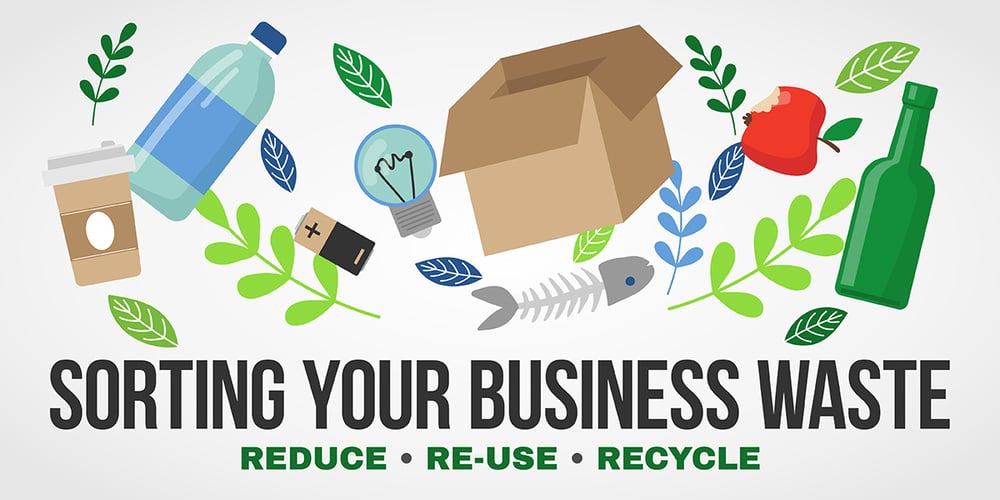How Hills responsibly dispose of business waste and why it's important

Nations, organisations and individuals are now aware of the urgent need to protect our world from the worst excesses of the climate crisis. Sustainable waste management practices have a vital part to play in helping society achieve its net-zero objectives, going beyond supporting the more traditional and historic objectives surrounding health for local communities and just getting rid of materials we no longer use.
To get to this more sustainable position, every person and organisation needs to take seriously a commitment to greater social responsibility. As well as being the right thing to do, customers, legislators and Directors alike all demand change.

And more and more businesses are changing. They are looking at the services they provide to their customers, changing the design of the products and packaging they make and use to market and protect their products. This feeds back up the supply chain to their suppliers and the offices they run. At Hills Waste our waste management services ensure all our waste is handled responsibly.
Disposal of Waste
When a company is left with materials that they have to dispose of, how they do this has now become an issue with their customers, who are keen to ensure it's done responsibly. Embracing the waste hierarchy as part of a business process has become more common, and responsible businesses are changing as a result. Protecting brand identity is now a major driving force for selecting responsible waste management companies, ensuring that the best disposal methods are applied for each type of waste produced, whilst trying not to impact on profitability.
Disposing of waste sustainably and reducing landfill waste has now become mainstream.
Did you know...?
- According to the government, the UK generated a staggering 222 million tonnes of waste in 2018. Commercial and industrial waste weighed in at a hefty 33 million tonnes.
- Just over 63% of packaging waste was recycled in the UK in 2021 – a good start, but we can do better. By recycling just 25 plastic bags, we can save enough energy to power a laptop for a full working day.
- And there’s more we can all do too: only 44% of waste collected by local authorities in England in 2020 was recycled or composted. Compare that with Wales who recycle 56.5% and its obvious there is much to do. On an international scale the top 3 European countries recycling above 50% of all waste collected are - Germany 65.5%, Austria 57.6% and Belgium with 53.9%.
What happens to some of the most common types of business waste that’s collected by Hills?
.jpg?width=941&height=693&name=15658%20Hills%20Waste%20(Recycling%20Waste%20Process%20Flow%20Diagram).jpg) In 2023 Hills Waste Solutions diverted 213,149 tonnes of waste from Landfill, generated 21,637 tonnes of compost and recycled 98,406 tonnes of waste.
In 2023 Hills Waste Solutions diverted 213,149 tonnes of waste from Landfill, generated 21,637 tonnes of compost and recycled 98,406 tonnes of waste.
Benefits of recycling
There are lots of social, environmental, and financial benefits to recycling. By taking recyclable materials out of the general waste stream, less waste is taken to licenced landfill sites, where it would otherwise be buried. By recycling, there’s the potential for cost savings throughout the value chain, saving on raw materials. Potential energy savings are also possible by using recycled materials rather than manufacturing from raw materials. This reduces the impact on finite natural resources, particularly fossil fuels and rare minerals, rather than extracting these resources to make more products.
There are of course cost implications associated with recycling at scale, to ensure environmental and legal requirements are met, as well as ensuring that the business can be run economically for the benefit of both customers, operators and society in general. It can be expensive to set up a recycling operation due to the operational costs of design, build and machinery to run these facilities - which are all high.
In order to have an effective recycling plant it’s also very important to ensure that only the right materials enter the right recycling stream. Low quality, unclean or incorrect materials can contaminate recyclers’ output, reducing its value to the market and making the process less effective.
How does Hills dispose of dry mixed recycling?
Dry mixed recycling includes cardboard, paper, food and drink cans, plastic pots, tubs, and bottles. These materials are generally recyclable waste and businesses should ensure that their waste provider can properly send this waste to dedicated recycling facilities rather than unnecessarily mixed in with general waste.
How does Hills dispose of glass waste?
Glass is ideally suited to recycling as it can be melted and re-formed into more glass, an infinite number of times.
Glass waste specifically means glass jars and bottles – including any labels, lids and tops – rather than other glass products such as drinking glasses, windowpanes or lightbulbs which are considered specialist materials. Pyrex, glass ovenware which has been treated to withstand high temperatures, isn’t suitable for melting and re-processing. Consequently, some glass should not enter the recycling process.
Using recycled glass conserves precious resources in their natural environment, benefitting ecosystems and slowing down climate change. In fact, glass could be considered the ‘poster child’ for recycling given its ability to be recycled infinitely with no loss of quality. Naturally, it also generates less CO2 emissions than producing new glass and takes less total energy.
There are few downsides to glass recycling compared to other forms of waste disposal. There is of course a financial cost associated with recycling glass at scale, but specialist glass recycling operations are built to sufficient scale to make pricing attractive to waste management companies.
How does Hills dispose of food waste?
Food waste refers to organic, biodegradable waste from food products. It covers anything from waste by-products, such as vegetable peelings, tea leaves and eggshells, to uneaten, pre-packaged ready meals. When food is separated from the general waste stream at source, it’s usually sent to an anaerobic digestion facility to be turned into energy.
Anaerobic digestion of food waste provides an excellent and reliable source of renewable energy that can be fed back into the national grid to help power local homes and businesses more cleanly than using fossil fuels. As a valuable by-product, the process also creates organic compost and fertiliser for use in agriculture, helping to establish new food sources and reducing the need for chemicals in farming. As well as this, anaerobic digestion can help stem diseases in humans and animals alike by reducing the transmission of pathogens commonly found in manure. It produces less greenhouse gases than other types of food waste disposal and creates fewer odours, too.
Anaerobic digestion plants are a modern technological response to dealing with waste, and despite a relatively high initial cost it is mitigated by the value of the energy and agricultural outputs. Within 3 months the food waste becomes compost.
How does Hills dispose of general waste?
General waste includes black bag waste, lightweight and compactable waste, non-recyclable and non-hazardous waste which may be sent to an energy-from-waste (EFW) plant, a Mechanical and Biological Treatment plant (MBT) or, as a last resort, to landfill. Learn more about the waste hierarchy and our approach to landfill.
Hills Waste Compost
At our Park Farm facility, we are utilising local green waste by transforming it into nutrient-rich, peat-free compost. Our BSI PAS 100 certified compost is produced by shredding and stacking raw materials in 'windows', which are then turned and moistened to accelerate decomposition, typically taking around 12 weeks.
If you would like to find out more about how Hills can support you with your waste management, call our helpful Customer Support Team on 0808 145 4533.
References*
https://www.conserve-energy-future.com/advantages-and-disadvantages-of-recycling.php
https://ec.europa.eu/eurostat/databrowser/view/cei_wm011/default/table?lang=en
https://www.savemoneycutcarbon.com/learn-save/how-long-does-it-take-for-plastic-to-biodegrade/
https://environmental-conscience.com/landfills-pros-cons/

